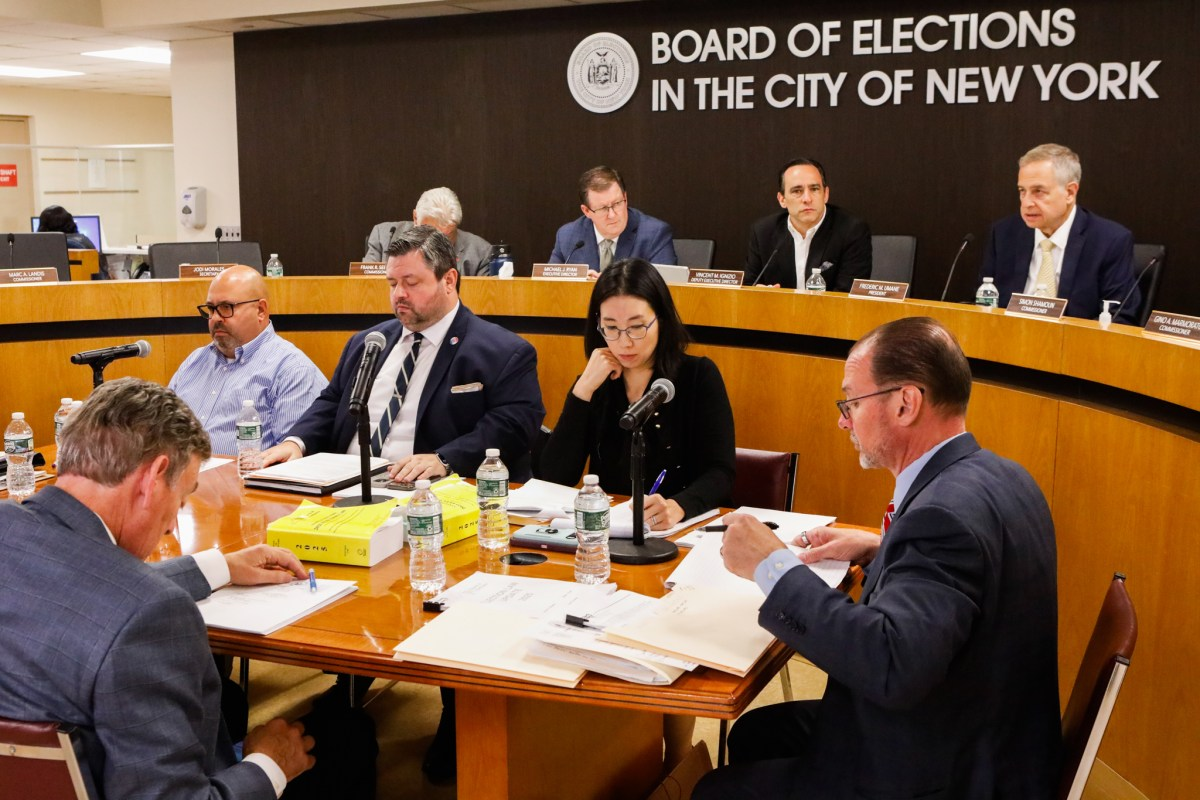Mortgage Rates on the Rise
Mortgage rates are rising, according to the Times, in the wake of the troubles surrounding Fannie Mae and Freddie Mac. While rates continue to be low by historical standards, they’re high compared to the levels they’ve been at in the past several years: The average yesterday was 6.71 percent for 30-year, fixed-rate mortgages, up from…

 Mortgage rates are rising, according to the Times, in the wake of the troubles surrounding Fannie Mae and Freddie Mac. While rates continue to be low by historical standards, they’re high compared to the levels they’ve been at in the past several years: The average yesterday was 6.71 percent for 30-year, fixed-rate mortgages, up from 6.44 percent on Friday, and 7.8 percent for jumbo loans. Rising rates primarily threaten to affect borrowers who have had loans with an interest-only teaser period, which could deepen the national housing morass. When we get to rate levels like this, the market just shuts down, said a mortgage broker based in Colorado. Some analysts argue that the rising rates are a temporary blip. Do any readers have first-hand experiences to report from the last few days?
Mortgage rates are rising, according to the Times, in the wake of the troubles surrounding Fannie Mae and Freddie Mac. While rates continue to be low by historical standards, they’re high compared to the levels they’ve been at in the past several years: The average yesterday was 6.71 percent for 30-year, fixed-rate mortgages, up from 6.44 percent on Friday, and 7.8 percent for jumbo loans. Rising rates primarily threaten to affect borrowers who have had loans with an interest-only teaser period, which could deepen the national housing morass. When we get to rate levels like this, the market just shuts down, said a mortgage broker based in Colorado. Some analysts argue that the rising rates are a temporary blip. Do any readers have first-hand experiences to report from the last few days?
Woes Afflicting Mortgage Giants Raise Loan Rates [NY Times]
Photo by woodleywonderworks





This is actually a good conversation. The What you are mostly on the right track. Here’s the thing, a bail out is NOT going to stop homes from depreciating nor will it stop job loss. So ask yourself what is the real reason for this bailout? Like all financial and political equations, you could probably find the answer by following the money.
Who ‘s going to make money or stop losing money? Dave, you’re assessment is wrong. Foreign holders of FNM are not calling in their markers. Just the opposite they’re buying more! The US has guaranteed the investments on these bonds, so no need to call the money in just yet. China could wait and actually make a run on these entities. Not in the traditional sense of when a run is made on a bank. But holding enough governments bonds that by default have control. Dark days ahead people. Start increasing those savings ‘cause a rainy day is very near
Chica, it’s very easy to say you’re not going to take it anymore or that there should be no more bailouts but consider this. If we fail to shore up Fannie and Freddie the Sovereign Debt Rating of the United States Government will be diminished. Foreigners have invested in Fannie and Freddie bonds with the belief that they are guaranteed by the US government. The implications of the US government’s Sovereign Debt rating getting cut are enormous because of the budget defecit and our need to continually borrow money to pay our bills. The national debt will be about 10 trillion when Bush leaves office (thank god) and everyman woman and child owes roughly $30,000 to pay it off. If our Sovereign Debt rating goes down, that means the interest we pay to continually borrow to fund our budget will go up. It’s like the credit card companies raising your interest rates because your credit score has gone down.
There’s only two ways to lower our budget defecit cut spending or raise taxes. Our budget is roughly 3 trillion. Of that budget, roughly two thirds goes to the following – Defense, Social Security, Medicare, and interest on the National Debt. You can’t touch any of these programs and no one is even suggesting cutting these. Everything else, everything, is the remaining one third of the national budget. There really isn’t a lot to cut if you eliminate these sacred cow programs. So we can’t cut spending, will we raise taxes to pay off the national debt? Highly unlikely especially considering the economic downturn.
So, what’s the solution, there really isn’t one, not one that won’t cause massive pain and no one gets elected promising that. So we’ll keep trying to stick our fingers in the dike and hope that the whole thing won’t collapse. It eventually will, but the to forestall that, we must “rescue” fannie and freddie and keep the interest rates down of our national government.
What. That’s assuming that the primary concern of the Fed is to stamp out inflation. Generally, this is the case and follow the ‘Taylor Rule’, which is a formula that describes how the fed fund rate is set in response to deviation in US inflation from the Fed’s implicit inflation target and in U.S output from estimated level of potential output. Given their concern’s about the fragility of the financial system, they have pushed their target levels far below the level prescribed by the Taylor rule. (4% verses 2%).
As the economy continues to be weak, there is a likelihood that they yield on your “4, 13, 26” week bills can come down, meaning that the Fed will not have to ‘follow the market’.
My point is that the Fed does not follow the yields on the T-bills lockstep, there are short term deviations. You cannot claim to know the future of inflation and say that the “4, 13, 26” are going to go through the roof.
But if consistent inflation picks up, then the Fed will have no choice.
Also, the ‘mutant real estate bubble’ is bursting. Just not too badly in most urban cores, and apparently not too badly in Brooklyn as well. Your doom and gloom predictions need to realize that there’s a paradigm shift going on.
http://www.businessweek.com/lifestyle/content/jul2008/bw20080711_257959.htm?campaign_id=rss_daily
http://www.csmonitor.com/2008/0521/p01s04-usec.html
Maybe if oil ever gets back to $15/barrel you finally will be right.
The What – do you understand how the backstop works?????
Yes all of Treasury will be pledged to backup the GSEs but the $ will not need to be SPENT.
I know you are rooting for the end of the world and this hurts the cause but the “taxpayer” will be hurt much more by the devaluation of all their assets, massive unemployment and social collapse – then by the Gov’t pledging to backstop the entities they created and have tasked to expand homeownership to every man women and child.
I agree however – more oversight and less compensation to run a quasi govt entity is appropriate.
But the government has to help Taggart Transcontinental! We need trains!
“But the Fed does not have to ‘follow the market’. We’ve had periods of negative real interest rates in the past 10 years and it looks like Bernanke and Co. are willing to repeat the mistakes of the very recent past, with different but an equally less desirable outcome (i.e general inflation vs. an asset bubble).”
Do me a favor, go find the chart of the 4, 13, 26 T-Bills and the Fed chart. You will see what I’m talking about. Plus don’t worry, The Bond Market is going to kill the Mutant Real Estate Asset Bubble!
Dora Chica! The What salutes you! You should be mad as heel about the Mortgage Bailout bill! Government is taking care of their Homeboys at the taxpayer expense and most people are too God damn dumb to figure it out! You should call your representatives and tell those Asshats not to vote for this crap!! You are the first person on this blog that get it! You see Dora there are Retards like this “That being said – I predict now that not 1 dime of Treasury $ will be spent to shore up Freddie or Fannie -” All of the Treasury’s money will shore up Fannie and Freddie until Bush leaves office!
The What
Someday this war is gonna end….
“I should have known better. There’s a big difference between ignorant and stupid and The What is the latter.
Good bye.”
Hey Dumdassinbedstuy are you really going to leave me alone? Please go away and don’t ever mess with me again.
Buh bye…
The What
Someday this war is gonna end…
Mr. What. The short term bond market is less sensitive to inflation expectations. It is greatly influenced by the Fed. But you are right, it is not ‘set’ by the Fed.
But the Fed does not have to ‘follow the market’. We’ve had periods of negative real interest rates in the past 10 years and it looks like Bernanke and Co. are willing to repeat the mistakes of the very recent past, with different but an equally less desirable outcome (i.e general inflation vs. an asset bubble).
Dora – you might be mad (and probably have a right to be) but if U.S. Government didnt backstop Freddie and Fannie then the world as we know it would cease to exist – if the GSEs collapsed the only thing that would protect you would be diamonds shoved up your a$$ and a gun.
That being said – I predict now that not 1 dime of Treasury $ will be spent to shore up Freddie or Fannie – they bought mostly good loans – it was the Merrill Lynch’s, Bears, et al. that bought up all the real crappy stuff. Regardless of what the mark-to-market is today, the assets held on their books are preforming and will continue to perform.